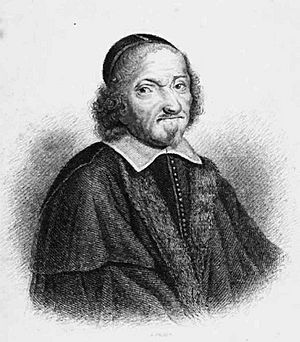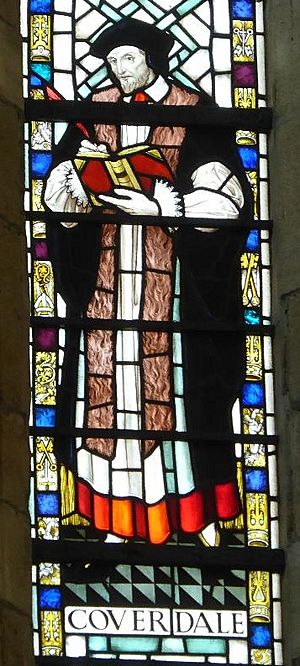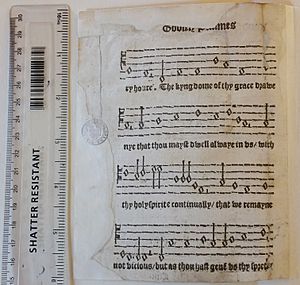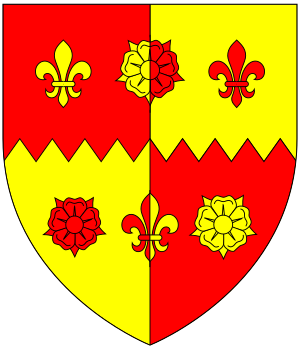Myles Coverdale facts for kids
Quick facts for kids The Right Reverend Myles Coverdale |
|
|---|---|
| Bishop of Exeter | |
 |
|
| Church | Church of England |
| See | Exeter |
| Enthroned | 1551 |
| Reign ended | 1553 |
| Predecessor | John Vesey |
| Successor | John Vesey |
| Orders | |
| Consecration | 30 August 1551 by Thomas Cranmer |
| Personal details | |
| Born | c. 1488 Yorkshire, England |
| Died | 20 January 1569 (aged 80-81) London, England |
| Buried | Church of St Bartholomew-by-the-Exchange, then St Magnus-the-Martyr, both in the City of London |
| Denomination | Catholicism; later an early Anglican reformer and regarded as "proto-Puritan" in his later life. |
Myles Coverdale (born around 1488 – died January 20, 1569) was an important English church leader. He is best known for translating the Bible into English. He was also a preacher and, for a short time, the Bishop of Exeter (from 1551 to 1553).
In 1535, Coverdale created the first complete printed English Bible. His journey shows how the English Reformation changed between 1530 and 1552. By the end of his life, he was seen as an early Puritan, a group that wanted to make the Church of England simpler.
Contents
- Early Life and Studies (until 1528)
- First Time in Exile (1528-1535)
- Coverdale's Bible Translation (1535)
- More Bible Translations (1537-1539)
- Second Time in Exile (1540-1547)
- Return to England (1548)
- Becoming Bishop of Exeter (1551)
- Third Time in Exile (1553-1559)
- Life in London (1559-1569)
- Legacy
- Works
- See also
Early Life and Studies (until 1528)
Myles Coverdale was likely born in Yorkshire, England, around 1488. He studied philosophy and theology at Cambridge University. In 1513, he earned a degree in canon law, which is church law.
In 1514, he became a priest in Norwich. He joined the Augustinian friars in Cambridge. Here, he met Robert Barnes, who was a leader of the friars. Barnes had studied with Erasmus, a famous scholar, and believed in Christian humanism. This was a way of thinking that combined Christian faith with a focus on human values and reason.
Barnes taught his students by reading from the Bible and classical writers. This helped them think about reforming the church. In 1526, Coverdale went to London with other friars. They were there to defend Barnes, who had been accused of preaching ideas similar to Luther. Luther was a key figure in the Protestant Reformation. Coverdale acted as Barnes's secretary during this trial.
Later, in 1539, a law called the Act of Six Articles was passed. This law made it very difficult for radical Protestants. Sadly, Barnes was executed in 1540 for his beliefs.
Coverdale probably met Thomas Cromwell, a powerful advisor to King Henry VIII, before 1527. By 1528, Coverdale had left the Augustinian friars. He started preaching in Essex against certain Catholic practices. These included the idea of transubstantiation (that bread and wine become the body and blood of Christ), worshipping sacred images, and confessing sins to a priest.
At that time, expressing such views was very dangerous. The future of religious change in England was uncertain. There was a strong effort to stop what was seen as heresy. Because of this danger, Coverdale left England for Europe in late 1528.
First Time in Exile (1528-1535)
From 1528 to 1535, Coverdale lived mostly in Antwerp, a city in Europe. Some historians believe he helped William Tyndale with his English Bible translations. Tyndale was also in exile and faced many difficulties.
In 1535, Tyndale was betrayed and arrested. He was held in prison and later executed in 1536. Meanwhile, Coverdale continued his work alone. He aimed to create the first complete English Bible in print. He wasn't yet an expert in Hebrew or Greek, the original languages of the Bible. So, he used Latin, English, and German sources, along with Tyndale's earlier translations.
Coverdale's Bible Translation (1535)
In 1534, church leaders asked King Henry VIII to have the entire Bible translated into English. As a result, in 1535, Coverdale finished his complete Bible and dedicated it to the King. It is believed that the Coverdale Bible was printed in Antwerp. The printing was paid for by Jacobus van Meteren. The first edition was finished on October 4, 1535.
Coverdale's translation used parts of Tyndale's New Testament and some Old Testament books. For other Old Testament books, he translated from German versions, like those by Luther.
A special part of Coverdale's work is his translation of the Book of Psalms. This version is still used today in the 1662 Book of Common Prayer, which is used by the Anglican Church.
More Bible Translations (1537-1539)
In 1537, the Matthew Bible was printed. It combined Tyndale's translations with parts from Coverdale's work. This Bible was dedicated to Henry VIII, who allowed it to be read. The editor, "Thomas Matthew," was actually a fake name for John Rogers.
The Matthew Bible had some controversial ideas. Also, it showed its connection to Tyndale, which could have caused problems for Cromwell and Thomas Cranmer, the Archbishop of Canterbury. So, in 1538, Coverdale was sent to Paris to oversee the printing of the "Great Bible." This Bible was meant to be very grand.
However, some English bishops and French theologians tried to stop the printing. The Pope even ordered the English Bibles to be burned. Coverdale managed to save some printed pages and the printing equipment. He brought them to London, where the work was finished.
Also in 1538, Coverdale published a New Testament that had two languages side-by-side. It showed the Latin Vulgate text next to his English translation.
In September 1538, Cromwell issued an order that strongly opposed "pilgrimages, fake relics, or images." It also stressed that the Bible was "the very lively word of God." This order said that every English church should have "one book of the whole Bible of the largest volume." The Great Bible was almost ready, but since there weren't enough copies, an edition of the Matthew Bible, edited by Coverdale, was used. People were also expected to learn other church texts in English, like the Creed and the Lord's Prayer.
In 1539, Coverdale was in Newbury, reporting to Cromwell about people who were still following old Catholic practices. He also helped burn old church books that didn't match the new rules.
Between 1535 and 1540, Coverdale's translations of the psalms were printed separately. These were based on his psalm translation in the 1535 Coverdale Bible.
Towards the end of the 1530s, conservative church leaders gained more power. They opposed Cromwell's policies. In 1539, the Act of Six Articles became law, which stopped official support for religious reform. Cromwell was executed in 1540, around the same time Coverdale's mentor, Robert Barnes, was burned. Since Cromwell had protected Coverdale, Coverdale had to leave England again for his safety.
Second Time in Exile (1540-1547)
In April 1540, a second edition of the Great Bible was released. This one included a foreword by Archbishop Thomas Cranmer. This is why the Great Bible is sometimes called Cranmer's Bible, even though he didn't translate it. There were seven editions of the Great Bible in total, up until 1541.
Before leaving England, Coverdale married Elizabeth Macheson, a Scottish woman who was also a religious exile. They first went to Strasbourg, where they stayed for about three years. During this time, Coverdale translated books from Latin and German. He also wrote an important defense of Robert Barnes. This writing is seen as one of his most important statements about church reform, besides his Bible prefaces.
He earned a doctorate degree from Tübingen and visited Denmark. He also started to learn Hebrew, becoming skilled in the language, just like Tyndale had been.
Return to England (1548)

When Edward VI became king in 1547, he was only nine years old. His uncle, Edward Seymour, acted as the country's protector. During Edward's reign, religious policy moved towards Protestantism.
Coverdale didn't return to England right away, but the situation looked better for him. In March 1548, he wrote to John Calvin, a famous reformer, saying he was returning after eight years of exile for his faith. He was welcomed at the new king's court. He became a royal chaplain and served the queen dowager, Catherine Parr. At Parr's funeral in September 1548, Coverdale gave what was called his "first Protestant sermon."
In June 1549, the Prayer Book Rebellion started in Devon and Cornwall. Coverdale was directly involved in preaching and trying to calm things down. A new law had made Latin church services illegal from 1549 onwards, replacing them with the Book of Common Prayer in English. The rebels in the west complained that the new English service was "like a Christmas game."
The rebellion began when someone trying to enforce the new rules was killed. The unrest was also caused by growing social problems. Lord John Russell, 1st Earl of Bedford was sent to stop the rebellion, and Coverdale went with him as a chaplain. The rebellion ended by late August. Coverdale stayed in Devon for several more months, helping to bring peace and doing the work that should have been done by the Bishop of Exeter. The bishop at the time, John Vesey, was 86 years old and had not left his home in Warwickshire.
Becoming Bishop of Exeter (1551)
In 1551, Coverdale spent Easter in Oxford with Peter Martyr Vermigli, another reformer. Martyr was a professor of divinity and helped Cranmer revise the Anglican prayer book. Coverdale attended Martyr's lectures, and Martyr described Coverdale as "a good man" who "labours greatly in Devon in preaching and explaining the Scriptures."
Martyr predicted that Coverdale would become the Bishop of Exeter. This happened on August 14, 1551, when John Vesey was removed from his position.
Third Time in Exile (1553-1559)
King Edward VI died on July 6, 1553. He had tried to prevent a Catholic return by changing who would inherit the throne. However, his plan lasted only a short time. Mary, Henry VIII's daughter, was declared Queen on July 19. This meant new danger for reformers like Coverdale.
He was quickly called before the Privy Council and placed under house arrest in Exeter on September 1. On September 18, he was removed from his bishopric, and Vesey, who was now 90, was put back in charge.
Thanks to his brother-in-law, who was a chaplain to King Christian III of Denmark, Coverdale and his wife were allowed to leave England. They went to Denmark, then to Wesel, and finally back to Bergzabern.
On October 24, 1558, Coverdale was allowed to settle in Geneva. He helped with the Geneva Bible, though the exact details are not well known. He was the only Englishman who had translated the entire Bible before. In Geneva, he became a godfather to John Knox's son and an elder of the English church there.
Life in London (1559-1569)
In August 1559, Coverdale and his family returned to London. They stayed with the Duchess of Suffolk, whom they had met in Wesel. He became a preacher and tutor to her children. He wrote that the duchess, like him, disliked the church ceremonies and elaborate clothing.
His strong views against church ceremonies were one reason he was not made a bishop again. However, some believe he felt he was too old for the responsibility. From 1564 to 1566, he was the rector of St Magnus the Martyr church in London.
Coverdale's first wife, Elizabeth, died in September 1565. He married his second wife, Katherine, in April 1566. After 1566, he resigned from his church position. He became popular among early Puritan groups because of his quiet but firm stand against church ceremonies and fancy clerical clothes.
Myles Coverdale died in poverty at the age of 80 or 81 on January 20, 1569, in London. He was buried at St Bartholomew-by-the-Exchange. When that church was torn down in 1840, his remains were moved to St Magnus. There is a plaque there in his memory. Coverdale did not leave a will.
Legacy
Coverdale's work, especially his first complete English Bible of 1535, has had a huge impact. For the 400th anniversary of the King James Bible in 2011, the Church of England recognized its importance and the Bibles that came before it:
- The Coverdale Bible (1535)
- The Matthew Bible (1537)
- The Great Bible (1539)
- The Geneva Bible (New Testament 1557, whole Bible 1560)
- The Bishops' Bible (1568)
- The Rheims-Douai Bible (New Testament 1582, whole Bible 1609-1610)
- The Authorised King James Bible (1611)
Coverdale was involved in the first four of these Bibles. He helped with the Matthew Bible and was deeply involved in editing and producing the Great Bible. He was also part of the group that created the Geneva Bible, which was very popular later with Oliver Cromwell's army.

Coverdale's translation of the Psalms is especially important in the history of the English Bible. His translation is still used in the Anglican Book of Common Prayer. Many musical versions of the psalms, like those in Handel's Messiah, use Coverdale's translation.
Coverdale also played an early role in creating hymn books. His Ghostly Psalms and Spiritual Songs is considered the first English hymn book. It was printed around 1535. Many of his hymns were based on German Protestant hymns. Coverdale wanted his "godly songs" to be for "our young men ... and our women spinning at the wheels." He believed that people who couldn't read the Bible easily could learn its teachings through song. However, his hymn book was also put on a list of forbidden books in 1539. Only one complete copy still exists today.
Myles Coverdale is honored, along with William Tyndale, on October 6 in the liturgical calendar of the Episcopal Church (USA). His many connections with reformers in England and Europe were key to the development of different English Bible versions.
Works
- Remains of Myles Coverdale: Containing Prologues to the Translation of the Bible, Treatise on Death, Hope of the Faithful, Exhortation to the Carrying of Christ's Cross, Exposition Upon the Twenty-Second Psalm, Confutation of the Treatise of John Standish, Defence of a Certain Poor Christian Man, Letters, Ghostly Psalms and Spiritual Songs. (1846)
- Writings and Translations of Myles Coverdale: The Old Faith, A Spiritual and Most Precious Pearl, Fruitful Lessons, A Treatise on the Lord's Supper, Order of the Church in Denmark, Abridgment of the Enchiridion of Erasmus (1844)
- Memorials Of The Right Reverend Father In God Myles Coverdale, Sometime Lord Bishop Of Exeter; Who First Translated The Whole Bible Into English: Together With Divers Matters Relating To The Promulgation Of The Bible, In The Reign Of Henry The Eighth (1838)
- The Letters Of The Martyrs: Collected And Published In 1564 With A Preface By Miles Coverdale (1838)
See also
- Psalms
- Timeline of the English Reformation
- Censorship of the Bible § England
 | Shirley Ann Jackson |
 | Garett Morgan |
 | J. Ernest Wilkins Jr. |
 | Elijah McCoy |


